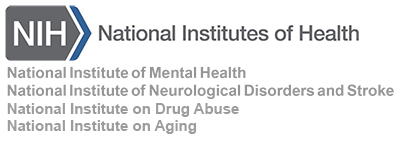Lithium improves HIV-associated neurocognitive impairment
| Title | Lithium improves HIV-associated neurocognitive impairment |
| Publication Type | Journal Article |
| Year of Publication | 2006 |
| Authors | Letendre, S, Woods, SPaul, Ellis, RJ, Atkinson, JH, Masliah, E, van den Brande, G, Durelle, J, Grant, I, Everall, I |
| Journal | AIDS (London, England) |
| Volume | 20 |
| Pagination | 1885-8 |
| Date Published | 2006 |
| Keywords | Administration, Adult, CD4 Lymphocyte Count, Cognition Disorders, Female, HIV Infections, HIV-1, Humans, Internal, Lithium Compounds, Male, Middle Aged, Neuroprotective Agents, Neuropsychological Tests, Oral, Pilot Projects, RNA, Treatment Outcome, Viral |
| Abstract | OBJECTIVE: To determine the effects of low-dose oral lithium on the neuropsychological performance of individuals diagnosed with HIV-associated neurocognitive impairment. DESIGN AND METHODS: The project was a single-arm, open-label, 12-week pilot study at a university-based tertiary care center. The participants were adults who had been diagnosed with HIV-associated neurocognitive impairment and had been on stable antiretroviral therapy for at least 12 weeks. Conditions that could affect cognition, worsen adherence to study procedures, or increase the risk of lithium adverse reactions were excluded. Twenty-one individuals were screened and eight were enrolled, all of whom completed the study. Oral lithium was initiated at 300 mg daily and was titrated to maintain 12-h trough concentrations between 0.4 and 0.8 mEq/l. Global neuropsychological performance was assessed by the global deficit score. RESULTS: At baseline, all participants had impaired neuropsychological performance and most had reduced CD4 cell counts (median 292 cells/microl), and HIV RNA levels in plasma below 400 copies/mL (seven of eight). Titrated lithium doses ranged between 600 and 1200 mg/day. Performance improved in all eight individuals after 12 weeks, and became unimpaired in six. The study treatment was well tolerated with no grade 3 or 4 adverse events and no premature discontinuations. CONCLUSIONS: Lithium resulted in improved neuropsychological performance in antiretroviral-treated, impaired individuals in this small, open-label study. Based on published in vitro data, lithium may exert this effect by inhibiting neuronal glycogen synthase kinase-3beta. |
| URL | http://www.ncbi.nlm.nih.gov/pubmed/16954730 |

